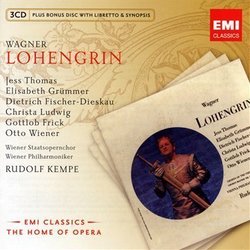| All Artists: Jess Thomas, Elisabeth Grümmer, Otto Wiener, Dietrich Fischer-Dieskau, Christa Ludwig, Gottlob Frick Title: Wagner: Lohengrin (2 CD/CD-ROM) Members Wishing: 0 Total Copies: 0 Label: EMI Classics Original Release Date: 1/1/2010 Re-Release Date: 4/20/2010 Genre: Classical Style: Opera & Classical Vocal Number of Discs: 4 SwapaCD Credits: 4 UPC: 5099945646522 |
Search - Jess Thomas, Elisabeth Grümmer, Otto Wiener :: Wagner: Lohengrin (2 CD/CD-ROM)
 | Jess Thomas, Elisabeth Grümmer, Otto Wiener Wagner: Lohengrin (2 CD/CD-ROM) Genre: Classical
"Thomas combines ardour and anguish as well as any, and with Fischer-Dieskau a formidable (but never over-emphatic) antagonist, and Gottlob Frick a majestic King Henry, the drama of the opera's central conflict remains sup... more » |
Larger Image |
CD Details
Synopsis
Album Description
"Thomas combines ardour and anguish as well as any, and with Fischer-Dieskau a formidable (but never over-emphatic) antagonist, and Gottlob Frick a majestic King Henry, the drama of the opera's central conflict remains supremely immediate and powerful." Synopsis Set in the Dark Ages, Lohengrin tells of Elsa von Brabant, whose younger brother, Duke Gottfried, has disappeared. His regent, Telramund, claims the throne, accusing Elsa of murdering Gottfried. A deciding duel must be fought, and a mysterious knight, arriving in a boat drawn by a swan, presents himself as Elsa's champion. This is Lohengrin, but Elsa must never ask his name, even though he will marry her if - as duly transpires - he wins the duel. Telramund's scheming sorceress wife, Ortrud, plants doubts in Elsa's mind. On their wedding night Elsa asks her husband's name. Distraught, he agrees to tell her in public. His narration `Im fernen Land' reveals him as Lohengrin, a Knight of the Grail. Preparing to leave, he addresses his swan (`Mein lieber Schwan'), which, it transpires, is Gottfried, bewitched by Ortrud. Lohengrin prays and the young duke is restored to human form. As Lohengrin departs, Elsa dies of grief. Further enthralling moments in the often luminous score are the serene prelude to Act 1 and the exhilarating prelude to Act III, Elsa's hopeful `Einsam in trüben Tagen' and blissful `Euch Lüften', and - in stark contrast - Ortrud's pagan invocation, `Entweihte Götter'; but most famous of all is the Bridal Chorus, the melody known as `Here comes the bride'.

 Track Listings (18) - Disc #1
Track Listings (18) - Disc #1